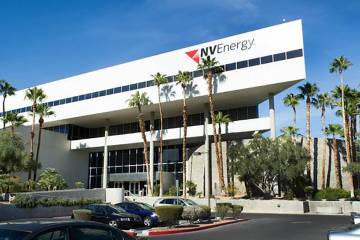Solar companies push back against NV Energy rate plan
CARSON CITY — The Nevada Public Utilities Commission is fast-tracking a proposed rate structure required by a new law that aims to increase the number of solar customers in Nevada.
Tesla; the solar company Sunrun; and the advocacy groups Vote Solar and Nevadans for Clean, Affordable Reliable Energy Solar this month filed petitions for leave to intervene in the case.
The motions do not outline the companies’ arguments, though the solar industry publicly expressed concern that NV Energy’s proposed rate structure is based on how much power a customer uses and would apply to all consumers, with or without rooftop solar units.
Sunrun said it will return to Nevada because of the passage of Assembly Bill 405 this year, but vice president of public policy Alex McDonough said NV Energy’s rate plan would hurt customers.
“NV Energy’s proposal goes far beyond restoring residential solar, which was required by AB405,” McDonough said. “It impacts all Nevadans and represents a complete overhaul of the way Nevadans are charged for electricity. It not only creates uncertainty for solar customers. It would impose higher fixed charges on all ratepayers.”
An NV Energy spokeswoman declined to comment. In the company’s filing, it claimed the proposed rate structure will shift costs in a way that reflects the law’s mandate of having a single rate class for solar and non-solar consumers.
Despite solar companies’ concerns about NV Energy’s proposed rate structure, state regulators are moving quickly to implement the new law by Sept. 1, massively expediting a process that normally unfolds within 210 days.
Jessica Scott, interior West director for Vote Solar, said the proposed rate structure is not fair to consumers.
“Rather than implementing the bipartisan AB 405 and restoring net metering as the Legislature intended to bring back solar, NV Energy’s proposal would create new roadblocks to solar, more uncertainty and increased fixed charges for all customers without justification,” Scott said in a statement.
The next step is a pre-hearing conference on Thursday. That will followed by hearings Aug. 21-23.
Contact Ben Botkin at bbotkin@reviewjournal.com or 775-461-0661. Follow @BenBotkin1 on Twitter.
What is net metering?
In net metering, people with rooftop systems get a credit for excess energy they return to the grid. The net metering changes will provide homeowners who invest in rooftop solar a credit of 95 percent of the retail rate, or what the customer would have been charged by the utility for each kilowatt hour of excess electricity generated by the rooftop system.
The 95 percent credit rate for the first tier of new rooftop solar customers would drop in future phases as the amount of electricity produced by rooftop systems hit benchmarks of 80 megawatts.
What is net metering?
In net metering, people with rooftop systems get a credit for excess energy they return to the grid. The net metering changes will provide homeowners who invest in rooftop solar a credit of 95 percent of the retail rate, or what the customer would have been charged by the utility for each kilowatt hour of excess electricity generated by the rooftop system.
The 95 percent credit rate for the first tier of new rooftop solar customers would drop in future phases as the amount of electricity produced by rooftop systems hit benchmarks of 80 megawatts.

















